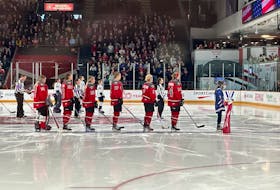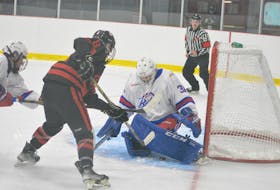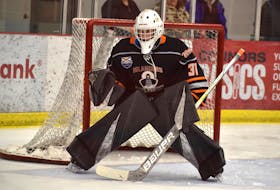When Sports Illustrated released its list of the most powerful, most influential and most outstanding women in sports earlier this month, it featured a diverse group of athletes, executives, activists and coaches.
Billie Jean King, Simone Biles, Maya Moore, Megan Rapinoe and Serena Williams were among the 53 honourees listed in the Oct. 6 SI cover piece titled The Unrelenting.
Scroll the list and between Williams and WNBA point guard Natasha Cloud is Jessica Berman, the deputy commissioner and executive vice-president, business affairs, of the National Lacrosse League.
Berman, who was raised in Brooklyn, N.Y., joined the NLL in the summer of 2019 after 13 years with the National Hockey League. She became the highest-ranking female executive of a professional sports league in North America and the first woman to hold the title of deputy commissioner.
Humbled to be honored among these inspiring and motivational icons. #Unrelenting #StrongerTogether #HardWork https://t.co/aVfgE0C6kO
— Jessica Berman (@JessicaBerman1) October 7, 2020
Berman has never played lacrosse but she has a passion for it and is especially proud of the league’s growth in recent years.
Since 2017, the NLL has grown from nine teams to 13. That includes the Halifax Thunderbirds, who were a success both on the floor and in the seats during their inaugural season before COVID-19 halted the 2019-20 campaign in March.
The Chronicle Herald reached out to Berman this past week. She discussed the challenges of operating a league during a pandemic, the overnight success of the Halifax franchise and her inclusion on the list of the most influential women in sports.
What did a typical day look like for you before the pandemic and what's it like now?
Before the pandemic I was traveling a ton, working from our headquarters in Philadelphia and my office in New York City, traveling for business development and to visit our teams all across North America. I spent much of my time either in meetings or on the phone. I joined the league in Sept. 2019 and I spent the first 3-6 months learning about the league. Then COVID-19 happened. It has been a unique first year of a new job.
Since the pandemic I have been working from my home in a suburb of New York City. Most days I get my work done between 6 and 9 a.m., then have video conference calls from 9-6 and then continue to get my work done in the evenings. The days are long and everything has been on my computer through video conference. I spend a lot of time on the phone with our board of governors and speaking with the other leagues which are facing the exact same challenges. There is a ton of collaboration happening in the sports industry; we are united in trying to bring sports back because we know how important it is to our fans and the communities we play for.
That being said, some of the work is similar to pre-pandemic. We are preparing for our 35th season. We are working on the league’s expansion strategy, on building our commercial business at the national and local level, with our players’ association, operating the league office and building relevance with our fans through owned, earned and paid platforms.
Besides games not being played, how much has COVID-19 affected the day-to-day operations of the league?
Everyone has been working remotely since March, and that is a huge change for everyone. In a typical year we would be gearing up to start our season next month. Our staff has pivoted to ensure that we keep our fans engaged by creating and delivering relevant content despite not having games to play. Although this situation was unprecedented, I am extremely proud of our league for being flexible, nimble and creative and the results are that it is working.
Of course, our fans want NLL games back, and we are doing everything we can to make that happen, but our fans are sticking with us and have been extremely patient and understanding of the situation.
I think the isolation of COVID-19 has caused people to reach out and connect more frequently, which is probably the opposite of what you would expect. Human nature demands human contact and connection and we are figuring out how to make that happen, even if it is through a computer screen.
The league is targeting the April 9-11, 2021 weekend to start its 35th season. With so much uncertainty surrounding sports during the pandemic, are you hopeful a season will be played in some form?
Of course, any plan is subject to change because we don’t control the impact of COVID-19. I can tell you that we will do everything in our power to play our season and we will make sure it is done with the health and safety of our players and fans as a top priority.
With the success of the “bubble” in the NHL and NBA, do you see that as a possible option for the National Lacrosse League?
I think it is unlikely that is an option for the NLL. Even the leagues who executed a bubble in the summer of 2020 have said that it is extremely unlikely they would do it again for a variety of reasons.

You have been with the NLL for over a year. The league has grown in terms of economics and in popularity. It has expanded and moved into new markets. Where do you see the league going, post-pandemic?
I strongly believe that we will continue the momentum we had pre-pandemic. The NLL has untapped potential for growth and I am confident that the strategies our league and the teams are developing and executing will catalyze that growth.
We have various new initiatives on the horizon including sports betting, content distribution, content creation, new forms of partnership within and outside the lacrosse community and, of course, our expansion strategy which will increase our footprint across North America. I joined this league because I share (NLL commissioner) Nick Sakiewicz’s vision for the NLL and its future.
Halifax, of course, is one of those new markets and the Thunderbirds were a hit with the fans and the community last season with an uptick in attendance at each home game. From a league executive point of view, what were the expectations of this market and franchise and were those expectations met?
When I joined the league I was told that the expectations (for Halifax) were high. (Thunderbirds owner) Curt Styres, Nick Sakiewicz, (team president and CEO) John Catalano and the Thunderbirds staff saw the potential and had a vision for that market. I think it is safe to say that their expectations were met and even exceeded. The market embraces having a team in their community and seeing it come to life last season was like magic. We can’t wait to see the momentum continue to build there.
Your inclusion in Sports Illustrated’s list of the most influential women in sports, what does that honour mean to you?
It was a jaw-dropping moment and one that I will cherish for the rest of my life. Seeing my name and accomplishments listed alongside icons such as Billie Jean King and Serena Williams is extremely humbling. To be honest, it made me want to work even harder in my life to continue to earn the right to be on that list. I view recognitions like that as a responsibility to myself, my family and anyone aspiring to have a career in sports.
You are the first woman to hold the title of deputy commissioner at any professional sports league in North America. The number of women in sports leadership positions has increased but the gender gap remains wide. How can that be remedied? Do you foresee more opportunities for women in executive roles?
I see many more opportunities for women in executive roles. Diversity of thought, experience and background leads to better results for companies and that has been proven through data. I have also observed that in recent years there are many more women in the pipeline than ever before which should result in increased representation at the executive level.









